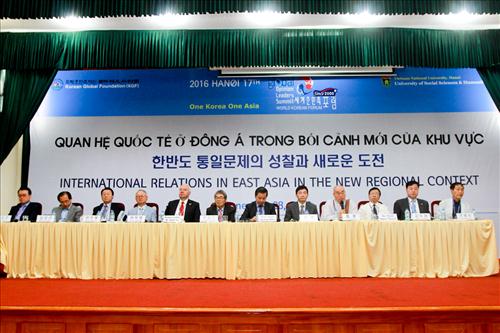
Looking back at the historical developments in the 50s of the 20th century, Vietnam and Korea have similarities when the country was divided. Up to now, Vietnam has been unified and its territory intact for more than 40 years, while Korea is still in the process of being divided. Therefore, the exchange of research on the issue of peace and political stability on the Korean peninsula in particular and the East Asia region plays a particularly important role for the development of the region in general and the relationship between Vietnam and Korea in particular.

Overview of the opening session of the workshop
In addition, the new world order after World War II has changed. Along with the development of economy, science and technology, in one way or another, Asia in general and East Asia in particular, is changing, showing its dynamism, becoming the center of transactions, of globalization, participating in the process of both cooperation and competition with full opportunities and challenges.
In that context, it is necessary to recognize and evaluate international relations in East Asia, the influences and domination of world powers, in order to move towards the goal of sustainable development and mutual benefit.

Associate Professor, Dr. Pham Quang Minh, Rector of the University of Social Sciences and Humanities, delivered a speech at the conference.
Vietnam and Korea are two countries located in the East Asia region, not only have many cultural similarities but also have a strong cooperative relationship in recent times. Currently, Korea is a country with many investment projects in Vietnam, and at the same time, Vietnam is also a major economic investment partner of Korea. It can be seen that in recent times, the two countries have been developing comprehensive relations in many fields.
This conference is a scientific forum for domestic and international scholars and experts to focus on academic exchanges and share experiences in research on current issues of the East Asia region.

Delegates are presenting their views at the conference.
The workshop took place over two days, from June 27 to 28, 2017 with 6 main sessions:
Session 1: A unified Vietnam and the Korean Peninsula with reports: international and domestic challenges in unifying the Korean Peninsula; The process of peaceful unification of the Korean Peninsula for a cooperative community of East Asian nations; The great victory of spring 1975 in the context and integration process of Vietnam; Diplomatic orientation for unifying the Korean Peninsula.
Session 2: New order in East Asia in the 21st century and the Korean Peninsula with reports: inter-Korean dialogue in the historical and political context of the East Asian region; Prospects for unification of North and South Korea and the establishment of an East Asian regional community: References to the unification of Germany and Europe; The weakening of the security mechanism on the Korean Peninsula in 2015-2016 and the position of the Russian Federation.

Researchers chaired the opening session this morning.
Session 3: Separation and Unification includes reports: Political regime and basic legal principles of a unified Korea; Leadership and nationalism factors in the process of unifying Vietnam; Factors affecting the economic achievements of Vietnam and North Korea; Factors affecting relations between the two Koreas
Session 4: New paradigm in negotiations on the unification of the Korean Peninsula with several reports: New paradigm in negotiations on the unification of the Korean Peninsula; Factors affecting the nuclear crisis of the Korean Peninsula and solutions...
Session 5: The Contemporary Role of Humanities and Economics includes reports: Eliminating Division and Unifying the Economy - The Path to a Greater Korea; The Role of Social Sciences and Humanities in the Unification Process;...
Session 6: Korean community and Korean businesses around the world with reports: Positive impacts of Korean communities abroad on the unification of the Korean peninsula; Korean unification and the role of reconciliation of the Korean community in the community of independent nations...
Author:Hoai An
Newer news
Older news